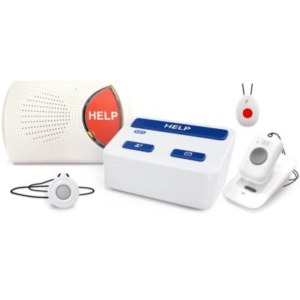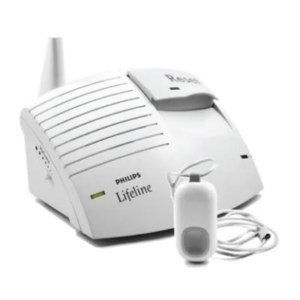Medical Alert vs. Philips Lifeline – What is the Best?
AgingInPlace.org keeps our resources free by working as an affiliate partner with some companies mentioned on our site. These partnerships or the commission we may earn do not affect our opinions or evaluations of the products we mention. Our reviews are solely based on our research methodology and from input from our AgingInPlace.org Advisory Board. Learn more about our ad policies.
Medical Alert vs. Philips Lifeline – What ...
Products carousel
Key Takeaways
- Medical Alert and Philips Lifeline offer many comparable services.
- Medical Alert offers a more affordable at-home system.
- Philips Lifeline’s on-the-go system may be more convenient for most users.
Choosing between medical alert systems is not always easy. Many systems are very similar, which can make it difficult to compare lifeline companies. If two systems you’re considering are compared to each other by professional researchers, the information they provide can make your choice much easier.
Medical Alert and Philips Lifeline both offer at-home and on-the-go systems that share features. Because of that, you may be considering one or the other, but not know which one to choose. Either system could be the one that works best for you. Here is our analysis of how Medical Alert vs. Philips Lifeline compare to each other.
Why You Can Trust Our Expert Reviews

You deserve the best products for a better quality of life. We strive to create honest, helpful reviews backed by firsthand shopping, testing, and research. Our content is medically reviewed and unbiased to help you choose the right medical alert system for you or your loved one.
From over 1,000 hours of research, we chose 11 of the top brands that we believe are the best medical alert systems. We did the following throughout our research process:
- Consulted with geriatricians and adult caregivers
- Mystery shopped the brands
- Surveyed medical alert system users
- Tested various medical alert systems
- Interviewed experts in the field
- Read hundreds of verified customer reviews from trusted third parties such as Better Business Bureau (BBB) and Trustpilot
Medical Alert Overview
Medical Alert is based in Philadelphia, but its most notable feature is its call centers. They are operated 24/7 and allow support in 140 different languages. Medical Alert also offers personal emergency response systems for those outside the United States, which means that customers can be based in Canada, Puerto Rico, or even the Virgin Islands.
Medical Alert offers two different packages for users: an at-home medical alert system and a mobile help system.
The at-home medical alert system consists of a base station with a help button and either a wearable medical alert bracelet or pendant with another help button. The base offers two-way communication and a mobile app that connects with it. Both the bracelet and pendant are water-resistant, and fall detection is available for an additional fee.
The mobile system has a pendant and a bracelet that have to be carried together, which connect to the AT&T cellular network. They both offer two-way communication. A mobile app connects the two of them and both are waterproof. In addition, they offer GPS location tracking and optional fall detection.
Add-ons for both plans include a monthly protection plan for damaged or stolen equipment and a lockbox that can be obtained free during some promotions.
Pros
-
Offers service outside the U.S.
-
Help center available in 140 different languages
-
30-day free trial
-
No contract needed
-
Caregivers can track GPS location through available app
Cons
-
Since the company name is also the name of the type of system, it is harder to find online resources about them
-
Only a few add-ons are available
-
Wearable buttons are not rechargeable.
-
On-the-go system requires both pendant and bracelet to work
Philips Lifeline Overview
Philips Lifeline has been in business for 48 years and has an estimated 7 million customers. The company was one of the first medical alert companies to offer medical alert systems with fall detection, and it has a solid history of protecting seniors. The company is also one of the only medical alert system providers that has a professional installation option for all of its systems.
Currently, Philips Lifeline offers one on-the-go system, the GoSafe2 system, and two at-home medical alert systems: HomeSafe Standard and HomeSafe with AutoAlert.
The GoSafe2 is an all-in-one system that has a wearable pendant with two-way communication, GPS tracking, and fall detection automatically included. It’s waterproof and has a rechargeable battery that can hold a charge for two to three days.
The HomeSafe Standard can be used with a landline or a cellular connection and consists of a base station and a waterproof help button. The base offers two-way communication and covers up to 500 feet from the base. For larger homes, there is a Voice Extension box that works as another base station and can cover another 500 feet from its location. The help button can be worn as a bracelet or a pendant, and if it is pressed beyond the range of two-way communication, the call center will summon emergency responders to the home. HomeSafe with AutoAlert offers all the same features of the Standard, but also includes automatic fall detection.
A lockbox can be included with any plan for an additional $29.95. The Philips Care app is included with all plans and offers a chat feature for users and caregivers, notifications of device status, and a way to update billing information.
Pros
-
Fall detection automatically included with two plans
-
Mobile system is simple to use, consisting of one pendant
-
Month-to-month pricing is straightforward
-
Choice of emergency contact
Cons
-
HomeSafe system has $50 activation fee
-
No spousal monitoring or discount for a second user on GoSafe plan
-
GoSafe has device fee
-
Monthly fees can be pricier than other medical alert systems
Does Medical Alert Cost More Than Philips Lifeline?
The costs for both Medical Alert and Philips Lifeline depend on which package you choose. Medical Alert does not charge equipment fees or installation fees, while Philips Lifeline will charge one or the other based on the package you choose.
Medical Alert:
- At-Home System: The landline system costs $22.95 per month if paid by the month and $19.95 per month if paid for six or 12 months. The cellular system costs $32.95 per month if paid by the month and $29.95 per month if paid for six or 12 months.
- Mobile System: This system costs $42.95 per month if paid by the month and $39.95 per month if paid for six or 12 months.
- Add-ons: Fall detection is available on all systems for $10 a month. A monthly protection plan is $1 per month. A lockbox is available with an annual plan.
Philips Lifeline:
- GoSafe2: This system is $49.95 per month, with a $99.95 equipment fee.
- HomeSafe Standard: Costs for this system are $29.95 per month for the landline system and $43.95 for the cellular system. There is also a $50 activation fee, and the voice extension box will cost you $10 per month.
- HomeSafe AutoAlert: Costs for this system are $44.95 per month for the landline system and $58.95 for the cellular system. There is a $50 activation fee, and a voice extension box will cost users $10 per month.
- Installation fees: There is a $19.95 cost for self-installation of all systems. It will cost $99 for a technician to install any system.
- Add-ons: Spousal support is available for $49.95 per month for GoSafe2 and $10 a month for both HomeSafe systems. A lockbox is available for $29.95.
Which Is Better: Medical Alert or Philips Lifeline?
Choosing Medical Alert vs. Philips Lifeline depends on what features and capabilities you want in a system. If you’re looking for an at-home system for a low cost, Medical Alert is the clear winner, with lower monthly fees overall and even lower ones when an extended plan is selected. In addition, Medical Alert charges no fees other than monthly ones for your plan and any add-ons you choose.

If you’re looking for a mobile medical alert system, Medical Alert is slightly less expensive. However, Philips Lifeline’s GoSafe2 is simpler to carry and use because it is a single pendant rather than the two-part Medical Alert system. It does charge an equipment fee, which some users on a fixed budget may find too much to spend in one go. Also, while Medical Alert offers a free 30-day trial period, Philips Lifeline does not offer any trial period. However, since there are no contracts for Philips Lifeline, it can be canceled at any time.
Bottom Line
If you’re looking at the cost of medical alert systems and are searching for an at-home system that is simple and not too expensive, Medical Alert is the clear choice over Philips Lifeline. On the other hand, Philips Lifeline offers a wider variety of add-ons and provides a similarly priced on-the-go medical alert system that is easier to use than Medical Alert.
What Is a Medical Alert System?

Since seniors are more at risk for health emergencies and falls, it may provide them or their caregivers peace of mind knowing they can always call for help if needed. Medical alert systems provide a service that lets them call for help. These systems usually consist of a pendant or bracelet that has a help button, which calls first responders if pressed. Some systems have a base unit that connects the button to a phone line, while others work on a cellular network and can be used anywhere if needed. Many medical alert systems also offer fall detection, where the system calls for help automatically if a fall is detected.
Comparing Other Medical Alert Systems We Recommend
If neither Medical Alert nor Philips Lifeline seems to be the perfect fit for your needs, there are several other systems available, including:
- Medical Guardian: Medical Guardian offers several comprehensive systems with on-the-go coverage and many useful features. It also offers optional fall detection.
- Aloe Care Health: Aloe Care Health’s system is voice-activated and does not require you to press a button, which is useful for those with mobility challenges. Caregivers can be connected to the system with an available app.
- MobileHelp: MobileHelp provides six medical alert system packages, from simple landline-based ones to smart ones with many apps and features. It offers a mobile tablet option that comes with medication reminders, caregiver tracking, and various games designed to keep the mind sharp.
- Bay Alarm Medical: Bay Alarm Medical’s on-the-go systems are some of the least expensive, starting at only $29.95 a month for a basic mobile system and a smartwatch-based system.
- LifeFone: LifeFone offers a medical alert system with one of the longest battery lives available (16–30 days depending on the device), as well as medication reminders, fall detection, daily check-ins and caregiver apps.
How We Review Medical Alert Systems
We reviewed the Medical Alert and Philips Lifeline Medical Alert Systems based on the following criteria:
- Price of installation and monthly service
- Warranties, contracts, and (whether it has any) hidden fees
- Reliability of monitoring center
- Comfort and wearability of mobile devices
- In-home range of equipment
- Water resistance of wearable devices
- Battery life and recharging requirements
- Ease of installation and use
- Expert opinion
- Customer service accessibility and performance
- Customer satisfaction reviews
- Company reputation
- Special features such as automatic fall detection, smartphone apps for family members, and location tracking
Frequently Asked Questions
-
The highest rated medical alert system currently featured on AginginPlace.org is the Medical Guardian system.
-
Lifeline offers an on-the-go system that consists of a single pendant rather than the two parts most mobile medical alert systems require.
-
Medical Alert offers service outside the United States as well as support in 140 different languages.
-
Most medical alert systems can be ordered directly from the provider’s website.
-
The best medical alert system is different for every user and depends on what they can afford as well as what features they are seeking.
Pricing is accurate as of May 31, 2022.
WRITTEN BY
Annie Keller is a freelance medical writer in Lowell, Mass. She has worked for a variety of medical publications and organizations. She has written about chronic illness, medical technology and devices, medical issues in the news, skin treatments, sports medicine, and many different conditions.
View AuthorDo you want to cite this page? Use our ready-made cite template.




